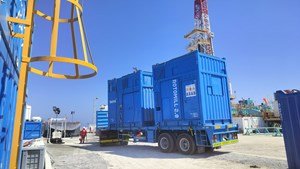(Bloomberg) – Anticipation of an oil windfall is making debt from Suriname, a tiny South American nation, one of the best performers in emerging markets this year.
Source: TotalEnergies
Bonds have jumped 3 cents on the dollar since July 25, when TotalEnergies’ Chief Executive Officer Patrick Pouyanne said the company could decide on its $9 billion project there as soon as the end of the third quarter.
Pouyanne — whose company, alongside APA Corporation, is moving to develop deepwater drilling sites that hold close to 700 MMbbl of oil — said Suriname will make a “significant” contribution to the group’s cash flows as oil revenues start flowing in 2028.
“This is gonna have a pretty significant, meaningful impact on the country,” said Kevin Daly, an emerging-market portfolio manager at the Aberdeen Asset Management. Revenues from the oil will be a “game changer,” he added.
Daly has been scooping up Suriname dollar bonds due in 2033 in recent months, expecting more gains once TotalEnergies makes a final decision on the project.
It could mark a turning point in what has been a choppy path to an oil boom for the former Dutch colony — TotalEnergies and APA have postponed making a decision on the project before. But after the July 25 call, Barclays halved its estimated probability of a “no final investment decision” scenario to 5% from 10%, recommending investors buy an oil-linked warrant that the government issued last year after it restructured its debt.
The “imminent timing” of a final investment decision and the nation’s continued progress with its program with the International Monetary Fund “should support further spread compression,” strategist Jason Keene wrote in an August 7 note.
Suriname’s risk premium declines three-fold in past year. It’s been a year of outperformance for Suriname bonds, which have returned 14.7% for investors compared to an average of 5% for emerging-market peers, according to data compiled by Bloomberg. The extra yield investors demand to hold the notes over similar US Treasuries has dropped nearly 200 basis points this year to 479 points, according to JPMorgan & Chase data.
Sovereign notes due in 2033 have climbed to 97 cents on the dollar from 83 cents when they were first restructured in December. The so-called value-recovery instrument, which matures in 2050 and will pay out after the government receives at least $100 million of oil royalties from an offshore reserve known as Block 58, has more than doubled in price and is now trading at 85 cents, according to indicative pricing data compiled by Bloomberg. It could rally another 10 to 24 cents, Barclays’ Keene wrote.
Fiscal progress. Suriname has also made progress when it comes to fiscal reforms, implementing a slew of measures including a full removal of fuel subsidies, phasing out of electricity, water and gas subsidies and broadening the value-added tax base. Central government debt has declined from 146% of GDP at the end of 2020 to 92.9% last year, and is projected by the International Monetary Fund to drop below 90% this year.
“The fiscal adjustment that they made was massive,” said Thomas Jackson, analyst at Oppenheimer & Co. “They went from running double-digit fiscal deficits, debt balance astronomically high to where they are today.”
Still, both the IMF and money managers like Artisan Partners, a long-time bull on Suriname who bought the securities last year, see risks on the horizon. There’s little clarity on who the frontrunners are for May 2025 presidential elections, especially amid rising social and political pressures due to effects of the reform plan.
“There’s of course a monkey wrench that could be thrown in with that,” said Brian Seel, sovereign analyst at Artisan. “Nobody knows what to make of the upcoming vote and best we can tell is that the president is incredibly unpopular despite being very popular internationally.”
President Chan Santokhi had an approval rating of 3% in 2023, according to a report by US Agency for International Development and Vanderbilt University.
Representatives for Santokhi’s office didn’t reply to messages seeking comment.
For now, bonds are trading on the country’s potential oil future, as investors expect more upside once they get more details on the progress of oil discoveries.
“I wouldn’t say the bonds are ignoring this limbo period that we have until first oil comes,” said Jackson. “But they’re very much forward looking, and the future looks great for Suriname.”
This article was originally posted at www.worldoil.com



Be the first to comment